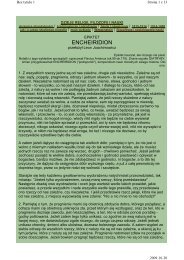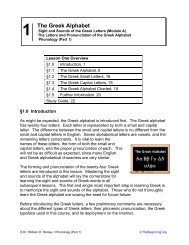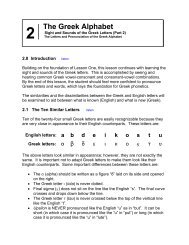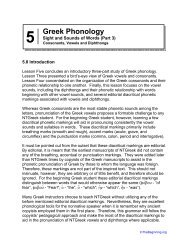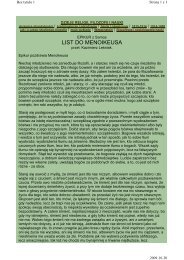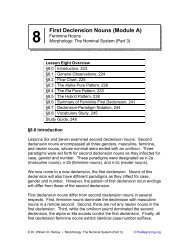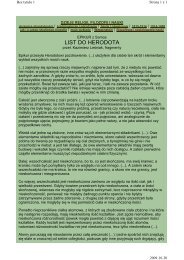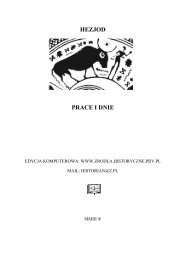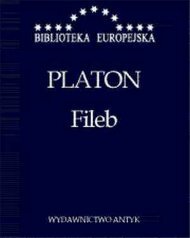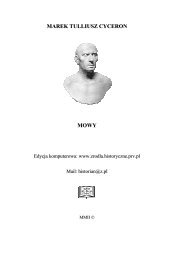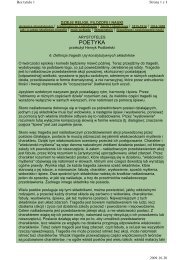OROZJUSZ CHOROGRAFIA PRZEZ ALFREDA ... - Kultura Antyczna
OROZJUSZ CHOROGRAFIA PRZEZ ALFREDA ... - Kultura Antyczna
OROZJUSZ CHOROGRAFIA PRZEZ ALFREDA ... - Kultura Antyczna
You also want an ePaper? Increase the reach of your titles
YUMPU automatically turns print PDFs into web optimized ePapers that Google loves.
Por. uwagi H. Łowmiańskiego, Stosunki polsko-pruskie, s. 154 i przyp. 8.<br />
159 Dosłownie: gebetan — modły błagalne; o roli tych modłów w kultach<br />
pruskich ob. Bertuleit, op. cit., s. 66 i n. Obyczaj palenia zwłok utrzymał się podobno<br />
jeszcze do XVIII wieku. Jak podaje J. H. Lidert (Preussische Frauenzimmer,<br />
Königsberg 1774): „Die art des begräbnisses und die kosten bey demselben waren<br />
ohne zweifei nach dem stände ihrer manner oder väter eingerichtet. Die körper der<br />
geringen leute verscharrte man in einer grübe, oder man verbrannte sie auch<br />
bisweilen. Die adlichen kamen gleichfalls in die erde, aufs beste angekleidet, wobei<br />
man ihren weiblichen schmuck beylegte. Die vom grossen adel und fürstlichem<br />
geschlechte mussten jederzeit verbrannt werden, und wurde zugleich ein Spinnrocken<br />
mit flachs, und was man ihr sonst gönnte, ins feuer geworfen". (Cyt. za G.<br />
Hübenerem, op. cit., s. 194). Ob. również H. Bertuleit, op. cit., s. 102 i n.<br />
Jest rzeczą interesującą, że Wulfstan nie wspomina o obyczaju palenia wdów,<br />
zanotowanym już przez Piotra z Dusburga i tak silnie rozpowszechnionym u ludów<br />
bałtyjskich; ob. tutaj W. Gaerte, Witwenverbrennung im vorordenszeitlichen<br />
Ostpreussen, Prussia, 29 (1931), s. 124 i n.<br />
160 Sposoby zamrażania ciał z terenów bałtyjskich cytuje G. Hubener, England,<br />
s. 193. Należy tutaj przytoczyć mniej znaną badaczom przeszłości bałtyckiej relację<br />
innego kupca angielskiego, Frynesa Morrisona, z r. 1593: „Give me leave to adde<br />
one observation, which to me seemed very strange. At Malvin (Marienwerder?,<br />
Malbork?) and Dantzke in Prussen, betweene Michelmas and Christmas, the country<br />
people bring in sledges laded with dead Hares, all frozen over, which are so<br />
preserved aswell and better, then if they were powdred with salt, till our Lady day in<br />
Lent, about which time the frost begins first to breake. And if they will eate a Hare<br />
in the meane time, they thaw it at the fier, or the oven of the warme stove, or by<br />
casting it into water, and so they presently set it to the fier, either to be rosted or<br />
boyled. In like sort they preserve Phesants, or any kind of flesh, being frozen over,<br />
as well as if they ware salted. And if any man thinke this a Travellers fiction, let him<br />
know, that a most credible person told mee, of his certaine knowledge and<br />
experience, that the Moscovites in Russia, bring the dead bodies of men in winter<br />
thus frozen over, and so lay them on heapes in the Bellfrees of the Churches, where<br />
they lie without rotting, or ill smell, till about our Lady day in Lent the snow begins<br />
to thaw, and the earth to be fit for digging (for till that time the earth is covered with<br />
deepe and hard snow, and if it were not so covered, yet is so hard by continuall<br />
frosts, as it cannot be digged). And at that time each family takes the bodies of their<br />
dead, and takes care to burie them", Itinerary, IV:4 (Cytuję za G. Waterhouse'm,<br />
Wulfstans account to the Esthonians, s. 327). Dalszy przykład z terenu Azji podał A.<br />
Macdonald, Wulfstan's voyage and freezing, s. 73-74 za A. Steinem, Ancient<br />
Khotan, t. I, London 1907, s. 329.<br />
161 Propontidis, Morze Marmara.<br />
162 Miejsce to poddał dokładniejszej analizie K. Malone, King Alfred's North, s.<br />
149, dochodząc do przekonania, że król Alfred zniekształcił tekst oryginału.<br />
Ustalenia Malone wymagają jednak korekty, jak wynika z poniższego zestawienia<br />
tekstów:<br />
92



